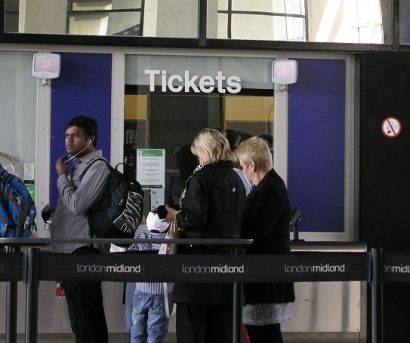Updated 09.52
REGULATED rail fares are set to rise by 3.2 per cent in January, after the Office of National Statistics published the Retail Prices Index for July.
Campaigners are calling for a fares freeze, while unions are opposing a suggestion by transport secretary Chris Grayling that if the lower Consumer Price Index is used to set future fare increases then it should also be used to calculate future railway wages.
The use of RPI as a basis for fare rises is being questioned increasingly, because it is an outmoded and discredited measure compared with the CPI.
Even the ONS no longer recommends RPI, but transport secretary Chris Grayling has ignited a new storm by suggesting that the lower CPI should also be the basis for future wage rises.
In a letter to rail unions, Mr Grayling said: “As you will be aware, one of the industry’s largest costs is pay. I support paying rail staff decent wages for the hard work they do, but I also now believe it is important that pay agreements also use CPI and not RPI in future when it comes to basing pay deals on inflation.
“I am not opposed to above inflation pay increases being individually negotiated between trade unions and employers in the industry where there are productivity or similar improvements that create the financial headroom for such deals. But it is difficult to justify using a different measure of inflation in the rail industry to the one that is widely used across services like the NHS.
“I think it is time to move the industry on to the same basis as elsewhere.”
Paul Plummer of the Rail Delivery Group said: “We understand that aspects of the current fares system are frustrating for people which is why as part of the industry’s plan, train companies are leading a consultation to update regulation and improve the range of fares on offer, making the system simpler and easier to use for customers.”
The idea of linking fares to wages has angered RMT general secretary Mick Cash, who said: “If Chris Grayling seriously thinks that front line rail workers are going to pay the price for his gross incompetence and the greed of the private train companies he's got another think coming.
"This is a basket case government and a lame duck transport secretary continuing its all out war on staff and passengers alike. RMT will fight any attempt to impose a pay cap on our members in a drive to protect private train company profits.”
Meanwhile, the prospect of January’s rise in regulated fares has been criticised by opposition politicians and transport campaigners.
Labour leader Jeremy Corbyn said: “The Government’s shambolic mismanagement of our railways has been a national embarrassment and they must now step in to freeze fares charged on the worst performing routes.”
His colleague shadow transport secretary Andy McDonald added: “The amount by which train companies can raise regulated fares is the responsibility of the transport secretary. This is a pathetic attempt by Chris Grayling to shift the blame for Tory fares policies. He has the power to enforce this, he’s just choosing not to.
“If the secretary of state recognises that train companies’ profits are responsible for sky high fares, instead of asking them to make less money, why not go one step further and end privatisation altogether?”
Transport Focus chief executive Anthony Smith is also calling for a freeze in fares. “After a torrid summer, passengers hit by the timetable crisis will be amazed that the talk is about a fares increase. A fares freeze would benefit all passengers begin the process of re-building trust and start to bring passengers back to a railway they can rely on”, he said.
He added: “On top of stagnant or falling real incomes rail passengers will feel the heat of any annual fares increase.”
Steve Chambers from the Campaign for Better Transport said: “The Government should freeze fares for January. Rail passengers have endured enough from the failures of the rail network this year, and being asked to pay more again next year will be a bitter pill to swallow. With the pressure on household budgets, this further increase in the cost of getting to work will hit people hard.”


